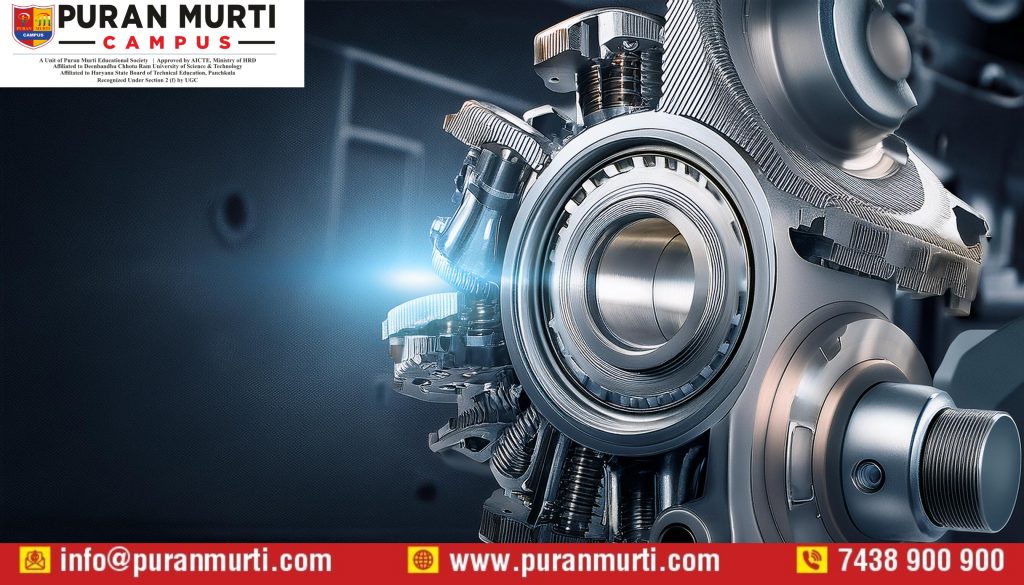What Makes Pursuing an M.Tech in Mechanical Engineering a Smart Move?
Posted on : 5 August, 2024 12:50 pm
Pursuing an M.Tech in Mechanical Engineering offers numerous benefits, including advanced technical knowledge and specialized skills. This degree opens up opportunities for higher-level positions in diverse industries such as automotive, aerospace, and manufacturing. With a focus on innovation and problem-solving, graduates can drive technological advancements and improve processes. Additionally, an M.Tech enhances research capabilities, paving the way for academic and R&D careers. In a rapidly evolving technological landscape, this advanced degree equips professionals to tackle complex challenges, making them valuable assets in the engineering field.
Introduction:
An M.Tech in Mechanical Engineering offers advanced education in the design, analysis, and manufacturing of mechanical systems. This program equips students with specialized knowledge in areas such as thermodynamics, robotics, and materials science. It emphasizes innovation, problem-solving, and research, preparing graduates for higher-level positions in various industries, including automotive, aerospace, and manufacturing. The degree also opens doors to academic and research opportunities, making it a valuable asset for career advancement.
- Advanced Education: Provides in-depth knowledge of mechanical engineering principles and advanced concepts.
- Specialized Skills: Focuses on areas such as thermodynamics, robotics, materials science, and fluid mechanics.
- Research Opportunities: Emphasizes research, allowing students to engage in cutting-edge projects and innovation.
- Problem-Solving: Develops advanced problem-solving and analytical skills crucial for complex engineering challenges.
- Industry Relevance: Prepares graduates for higher-level positions in industries like automotive, aerospace, and manufacturing.
- Technological Integration: Incorporates modern technologies and tools, enhancing practical and theoretical understanding.
- Career Advancement: Opens up opportunities for leadership roles, specialized positions, and academic careers.
- Global Opportunities: Equips graduates with skills and knowledge applicable in the global engineering market.
Skill Enhancement:
An M.Tech in Mechanical Engineering provides specialized knowledge and expertise in critical areas such as thermodynamics, fluid mechanics, robotics, and materials science. This advanced education equips students with the technical skills necessary to design, analyze, and innovate mechanical systems. Graduates gain a deep understanding of both theoretical concepts and practical applications, making them highly competent in tackling complex engineering challenges and driving technological advancements in various industries.
- Thermodynamics: Advanced understanding of energy systems and thermal processes.
- Fluid Mechanics: Expertise in the behavior and dynamics of fluids in various applications.
- Robotics: Knowledge of designing, building, and programming robotic systems.
- Materials Science: In-depth study of materials properties and their applications in engineering.
- Structural Analysis: Skills in analyzing and designing mechanical structures and components.
- Manufacturing Processes: Advanced techniques in modern manufacturing and production methods.
- Control Systems: Proficiency in designing and implementing control systems for mechanical applications.
- Computational Mechanics: Expertise in using computational tools and simulations to solve engineering problems.
Career Opportunities:
An M.Tech in Mechanical Engineering opens doors to diverse industry roles and higher-level positions across various sectors, including automotive, aerospace, energy, and manufacturing. Graduates are equipped to take on specialized roles such as design engineers, research and development managers, and project leaders. The advanced skills and expertise gained through the program also prepare them for leadership and managerial positions, driving innovation and efficiency within their organizations.
- Design Engineer: Creating and developing new mechanical products and systems.
- R&D Manager: Leading research and development projects to innovate and improve technologies.
- Project Manager: Overseeing engineering projects from conception to completion.
- Manufacturing Engineer: Optimizing production processes and ensuring quality control.
- Aerospace Engineer: Designing and testing aircraft, spacecraft, and related systems.
- Automotive Engineer: Developing and improving vehicle systems and components.
- Energy Systems Engineer: Working on renewable energy projects and improving energy efficiency.
- Academic and Research Roles: Teaching at universities and conducting advanced research in specialized fields.
Research and Development:
An M.Tech in Mechanical Engineering opens numerous opportunities in academic and R&D sectors. Graduates can pursue careers as university professors, contributing to education and mentoring future engineers. They can also engage in cutting-edge research, working in research institutions or industrial R&D departments. This advanced degree enables them to develop innovative technologies, publish scientific papers, and secure research funding, driving advancements in engineering and contributing to technological progress.
- University Faculty: Teaching and mentoring students in mechanical engineering at educational institutions.
- Research Scientist: Conducting advanced research in specialized fields to drive technological innovation.
- Research Engineer: Working on applied research projects in industry or government labs.
- Academic Researcher: Publishing research findings and contributing to academic knowledge.
- Grant Writer: Securing funding for research projects through grant applications.
- Laboratory Manager: Overseeing laboratory operations and ensuring research facilities are well-maintained.
- Industry Consultant: Providing expertise to companies and organizations on research and development projects.
- R&D Manager: Leading research and development teams to innovate and improve products and technologies.
Conclusion:
An M.Tech in Mechanical Engineering offers substantial long-term career benefits and growth potential. Graduates gain advanced technical skills and expertise, positioning them for leadership roles and specialized positions across diverse industries. The degree enhances career prospects, enabling progression into higher-level management and strategic roles. It also opens doors to academic and research careers, offering opportunities for continuous learning, innovation, and significant contributions to technological advancements over the long term.
- Career Advancement: Access to senior roles and leadership positions within organizations.
- Specialization: Expertise in niche areas leads to higher demand and specialized career paths.
- Increased Earning Potential: Higher qualifications often result in better salary prospects.
- Research Opportunities: Enhanced prospects for engaging in groundbreaking research and development.
- Academic Careers: Opportunities to become university professors and researchers.
- Industry Leadership: Ability to drive innovation and strategic initiatives within companies.
- Global Opportunities: Access to international job markets and global career prospects.
- Professional Growth: Continuous learning and professional development through advanced knowledge and skills.

